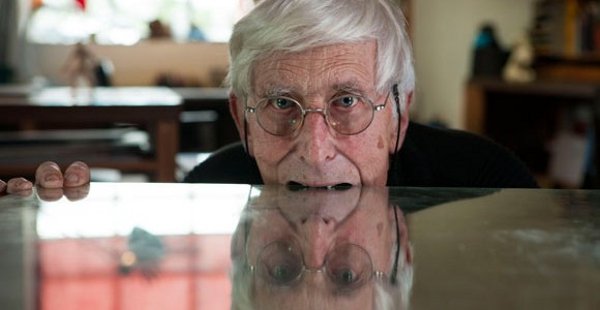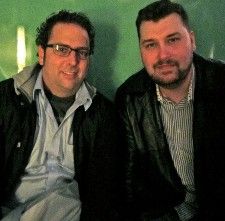
Before the US premiere at DOC NYC, I met up in the green room of the SVA Theater with director, producer Brad Bernstein and co-producer, editor, motion graphics animator Rick Cikowski, who did almost every animation in the exquisite Far Out Isn't Far Enough: The Tomi Ungerer Story.
The two collaborated from day one. Here is their far out journey with Tomi, who Bernstein said, at the very moment we were doing this interview on the afternoon of November 10, was being honoured at the Rome film festival.
Anne-Katrin Titze: How did you first know about Tomi Ungerer? How did he enter your life?
Brad Bernstein: We were working on a history of American music project down in Miami in 2007. And one day I was in my office and I was reading the front page of the arts section in the New York Times. Randy Kennedy had written an article about Tomi, and how he was being reintroduced to American audiences through Phaidon Press. Every sentence that I read jumped off the page, and I ran up to the editing room to Rick and I was, like: "This is our next documentary subject." Then Rick read the article and was mesmerised and we've been working on it ever since.
AKT: So you went from music to something very visual. I would not have thought from seeing this documentary that your main focus was music.

BB: We make a lot of documentaries on musicians, mostly for television… Tomi is not musical in that respect. But he's been drawing since he was three years old, so he's really a witness to the 20th century. Everything that his eyes have seen, he has drawn. And his mother had the foresight to keep everything, keep it through the war years.
AKT: And then he himself had to keep them, too.
BB: All the time he was in America, that stuff stayed in France with the mother. That body of work, tens of thousands of images, that make up his library and museum in Strasbourg.
AKT: It is fascinating how you show the relationship to his parents. In so many cases, in documentaries and beyond, the monsters lurking in the background are the parents. It's great to hear Tomi talk about the love for his father, who died when he was four, right? Which connects him to the Brothers Grimm, who were 10 and 11 respectively when they lost their father. There is a similar approach in their storytelling, taking children's fears very seriously. Did you talk about the Grimms at all?
BB: Yes, we did. Tomi was influenced by the Grimms. And there were a lot of parallels. He used the death of his father as motivation. And he had a very conflicting relationship with his mother. We only focus on one aspect of it, simply because there was only so much time.
AKT: And because you did not want to expose that?
BB: It's true. We've been accused of being hagiographic. But it's hard to sit down with Tomi and not like him.
AKT: What's wrong with celebrating someone's achievement, especially someone who went through as much persecution as he did? You are not idealising him.
Rick Cikowski: He is more negative than anyone else could be about himself. To go after him just to go after him doesn't make sense.
BB: He's his own worst critic.
AKT: How was his reaction to your film?
BB: He's been great. You know, he told us, he always had a hard time watching himself on camera.
AKT: Everybody does. Don't you? You didn't put yourselves on camera at all during the interviews.
RC: In every doc he does, he has his voice in there somewhere. You know, Tomi's son actually complimented him and the film. He said: "This is the first time in my life that I've really been proud to say that you're my father."
AKT: That's quite a statement.
BB: Tomi is really happy with how the film came out.
AKT: Speaking of his children. You only show his daughter on camera. The rest of the family did not want to be in the film? Or were they cut out by you?
BB: Oh, no! We would never have cut them out. We tried as hard as we could to include the rest of the family. They are the nicest people in the world, but they enjoy their privacy. And so we respected that. We spent a lot of time with them and they were wonderful and would have really helped the film.
AKT: I think we see his wife - in parts. An arm or a leg, somewhat appropriately. How does burnt Barbie smell?
BB: That was archival footage from the sixties in New York. He was burning a Barbie doll in a pot. He didn't do that for us.
AKT: I must have mixed it up with the collection of Barbie body parts he is showing you in the Alsace.
BB: I mean, he's got an insane amount of Barbie dolls, that he does who knows what with, other than his artworks.AKT: The Kafka nightmares you are talking about in the film. You travelled to the external places in Tomi's world?
BB: We were in Ireland, in France, and in New York. We travelled kind of around the world with Tomi, at least his world.
AKT: And then you had to structure the documentary.
RC: That's right. Then he [pointing to Bernstein] moved in with me…. When he lived with us for about six months, nine o'clock starting time in the garage, and at 11PM we would export it and watch it in my living room when everyone else was in bed. It was pretty intense.
AKT: Were there cars too in the garage?
RC: No, we moved those out.
BB: What's really interesting, now we have an office and stuff, we kind of long for the garage. When I was in film school, you hear about those. Whatever it takes to make a film. We really sacrificed a lot to make this and it was such a great experience... Rick converted his garage into our studio, and we had his two kids running around the house.
RC: So we'd make an edit, play with the kids, make an edit.
AKT: Good point. Is your film for children, too?
RC: I wouldn't let my kids watch it. Not, yet.
AKT: How old are your kids?
RC: Three and one.
AKT: At what age would you let a child watch it?
RC: I do show them his books. The Three Robbers became my oldest son's favorite book. Before we turn the page, he's like 'Blunderbuss!' It sticks with them. I see it firsthand.
BB: I don't think the documentary is for kids. I think the messages are good for children but I think the parents should take those messages and impart them upon their children.
AKT: Why? Because they wouldn't understand it? Because there are parts in it they might, well, how shall I put it, copy?
BB: On a very basic level, Tomi's sitting there rolling cigarettes, smoking throughout.
AKT: [tightening the grip on them] What age would you recommend?
BB: That's a good question. First time someone has asked that. Probably high school age... What's been interesting is hearing from distributors, about just the educational components. We do think it would be good for high schoolers. There are a lot of lessons for that age group in particular.
RC: You are looking at the history of art through one person's perspective. That doesn't happen very often.
AKT: I was so happy to see the early 16th century Isenheim Altarpiece in Colmar, painted by Matthias Grünewald in your film. I saw it as a child, when I was around 10 and it made a great impression.
BB: I was not aware of it before and it's pretty spectacular. You can tell, if you saw it when you were ten, and remember it to this day. Tomi has seen that on a daily basis. Being an artist, he was sort of coming to and learning his craft, you can see how it really impacted him.
AKT: You can go even further. You have the connection between the altar piece and Sendak, moving through Tomi Ungerer. Don't you almost see the wild things in the temptation of St Anthony?
RC: Yeah, those monsters.
AKT: Tell me about how you involved Maurice Sendak.
BB: We get emotional every time we talk about it. I called him. He was amazing on the phone. You know, I'd heard so many things about him: "He's that grumpy old guy on the hill." But he was nothing but charming and welcoming. We spent a day with him at his place in Connecticut, maybe a year before he died.
RC: Tell her about your first phone call!
BB: Well, 90 per cent of my phone call was about his impending death. He was always talking about death, very similarly to Tomi. Most of Tomi's work is about death. And Maurice is like, "Look, you got to get up here quick, because I'm going to die any day." It's so disarming when someone tells you that.

AKT: What do you think of the Mulberry campaign? Do you know what I am talking about? The Autumn/Winter 2012 fashion ads are an homage to Sendak's Where the Wild Things Are.
Just in case they did not know it, I brought my copy of the November issue of Vogue to the interview to show them one of the imaginative Mulberry ads with the model (unsuccessfully) protecting the furry monster from our glance.
BB: Wow, I think this is absolutely wonderful. I am sure Tomi would like that. I'm sure he's seen it.
AKT: From your experience at the various festivals you've shown the film at, what do the audiences respond to most?
RC: When he starts talking about the demons, that everybody has demons. I think everyone can relate to those. It's all about trying to conquer those demons to find success.
AKT: And then there's the question what is success.
BB: I agree, I think everyone is trying to find their place, and who they are, find their identity. And to our credit, we allow Tomi to bring it full circle. To show how he found his identity through his travels, you know, what he did for German Franco relations, trying to patch things up, kind of in his own way. He says at the end of the film, "I'm finally happy today. I have fewer anxieties."
AKT: Have you seen Sophie Fiennes' and Slavoj Žižek's The Pervert’s Guide to Ideology, yet?
BB: No, we haven't seen it, but we know very much about it. It was also in Toronto.
AKT: Be careful what you dream. You might have to change your dreams, that's a message you get in both documentaries.
BB: In fact, Žižek and Tomi were both in Toronto, so we thought: "Oh my gosh, can you imagine those two together?"
RC: Back to you what you were asking earlier. I think what people relate to is Tomi's sincerity. He can say some things that are kind of controversial, but it's so sincere the way he says it. I think people really connect to that.
AKT: Because it's so rare. And he is breaking the rules. He is Anna Karenina. He is highly aware, though, when he is provoking.
BB: Oh, yeah. He is very conscious about what he says. I remember after we spent the first day with him, drinking wine. This is before we ever shot anything, and him just getting a feel of who we were. And the next day, I showed up at the door [in Ireland,] and he opened it, and you know, his teeth are terrible, and he smiles and says: "My favorite Jew from New York." You can take that one of two ways, you know. How could you not like that? Unless you're so uptight, if that kind of thing bothers you.
AKT: How is Tomi?
BB: He is well. Thriving. He put out another book.
AKT: What is the book about?
BB: It's his first book where Ireland is the background. It's a children's book about fog.
Far Out Isn’t Far Enough: The Tomi Ungerer Story shows a man with a most fabulous sense of humour who seems afraid of nothing: "But nothing is fantastic too. If you are faced with nothing, you can fill it up - with your mind."
A full life, lived by someone who is highly aware of his contradictions, his wit, charm and the sharpness of his pen, is an extraordinary triumph to watch.
DOC NYC screening - 11:30 AM, Tue. Nov. 13, 2012 - IFC Center





















